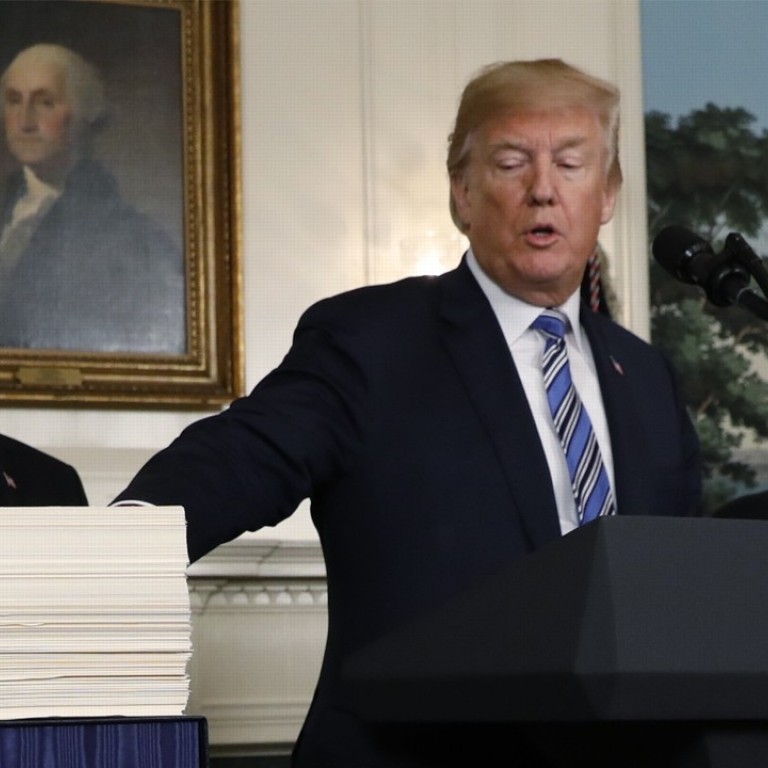
Donald Trump signs ‘ridiculous’ US$1.3 trillion spending bill after threatening veto and government shut down
Trump said he wanted to veto the bill for not agreeing to his demands for a border wall and protections for certain immigrants, but had signed it anyway to provide funding for the military
US President Donald Trump has signed the US$1.3 trillion spending bill that passed through the House and Senate on Thursday after threatening to veto it over concerns over “Dreamer” immigrants and a lack of funding for his Mexico border wall.
Trump called the formation of the 2,232-page bill a “ridiculous situation”, blaming Democrats for holding back on military spending and not agreeing to his terms for Dreamers.
He also vowed never to sign a similar bill, complaining that it was too large, too complex and under-read by those passing the laws through Congress.
“I say to Congress I will never sign a bill like this again – I won’t do it again,” Trump said. “Nobody read it, it’s hours old.”
Trump said that the bill provides a US$1.6 billion “initial down payment” for his promised border wall, building new sections and replacing old ones across 100 miles (160 kilometers) of the border.
That’s much less than the US$25 billion he wants, but he said the permitted work would begin “literally on Monday.” “This is a short term funding, but it’s immediate,” he said.
As well as the reduced border wall funding, Trump also complained that the legislation does not address some 800,000 “Dreamer” immigrants who are now protected from deportation under a programme that he has moved to eliminate.
But he said he signed it to provide needed money for the military, saying: “My highest duty is to keep America safe; nothing more important,” and that negotiations had been “crazy” and “difficult” because of Democrats’ “opposition to the military”.
Read China's furious response to America's US$60b tariffs in full
Spending on US defence will increase by US61 billion to US$700 billion, and is accompanied by a 10 per cent hike in domestic spending, which will rise to US$591 billion, Trump said.
He also called up Secretary of Defence James Mattis - a vocal opponent of Obama-era military spending caps - to praise the bill, and read out a lengthy list of hardware that the US would buy in.
Trump leaned heavily on the military theme, presumably to assuage his voters’ annoyance over the lack of full funding for the wall.
They will also be upset that - Planned Parenthood, which is a target of relentless criticism from pro-life Republicans because it offers abortion services alongside many other personal health and medical programmes - will continue to be funded until the next bill, in September.
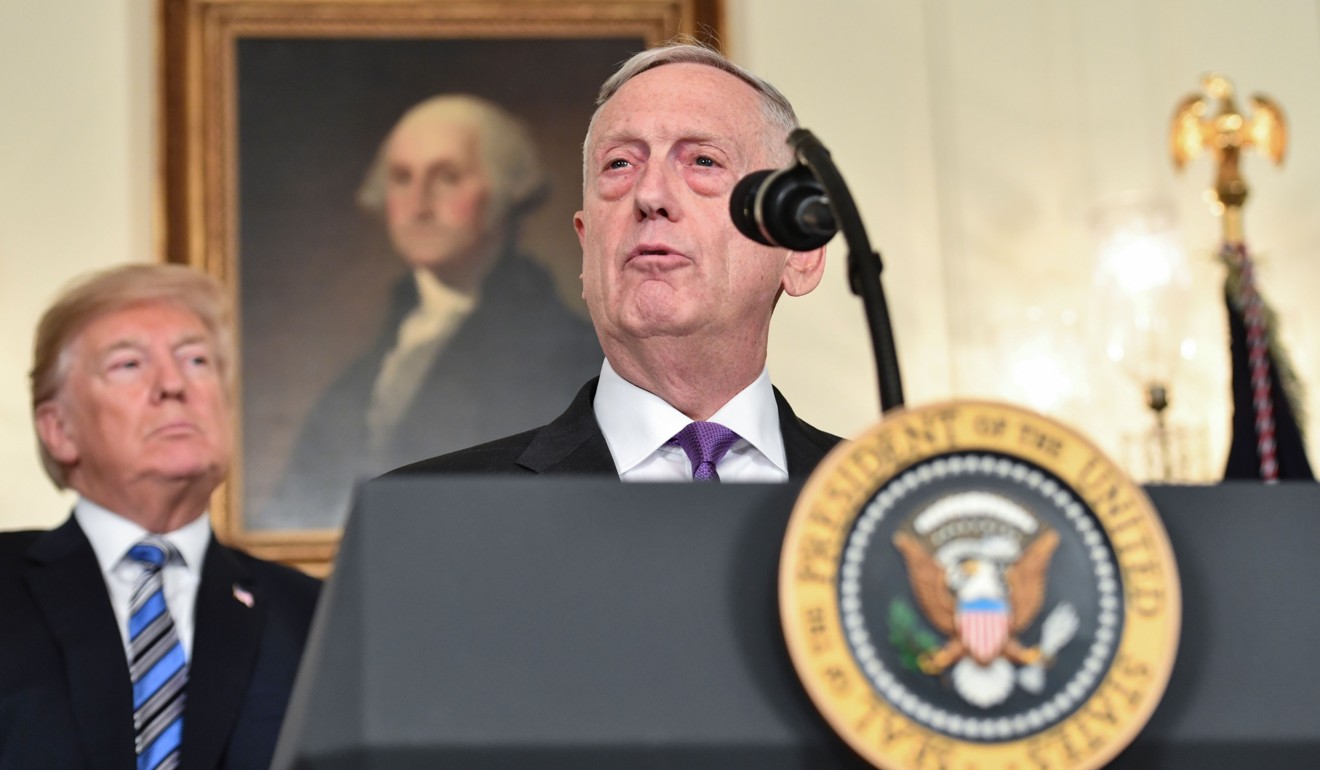
But in a major blow to Democrats, the bill sets aside the issue of the so-called “Dreamers,” who are in legal limbo following the Trump administration’s repeal of Deferred Action on Childhood Arrivals (DACA).
The policy, instituted by former president Barack Obama in an executive action, protects immigrants brought into the country as children from deportation.
DACA expired on March 5 after Trump refused to renew it but the issue is being fought in the courts. Attempts at a legislative fix collapsed in a previous round of negotiations to avert a government shutdown.
“We wanted to include DACA. We wanted to have them in this bill. 800,000 people. And actually, it could even be more. And we wanted to include DACA in this bill. The Democrats would not do it. They would not do it,” he said.
Watch: Playboy model tells CNN Trump tried to pay her after sex
Trump also raised the spectre of the US opioid epidemic, saying: “We’ll be suing certain drug companies for what they’ve done with the opioids and we’ll be bringing suits at a federal level.” He did not elaborate on that point.
The president finished by saying he wants to change the Senate’s rules to eliminate the filibuster, and allow passage of all bills on a simple-majority vote.
He also appealed to Congress for a line-item veto that would grant him the ability to cancel individual items within a spending bill without having to throw the whole thing out.
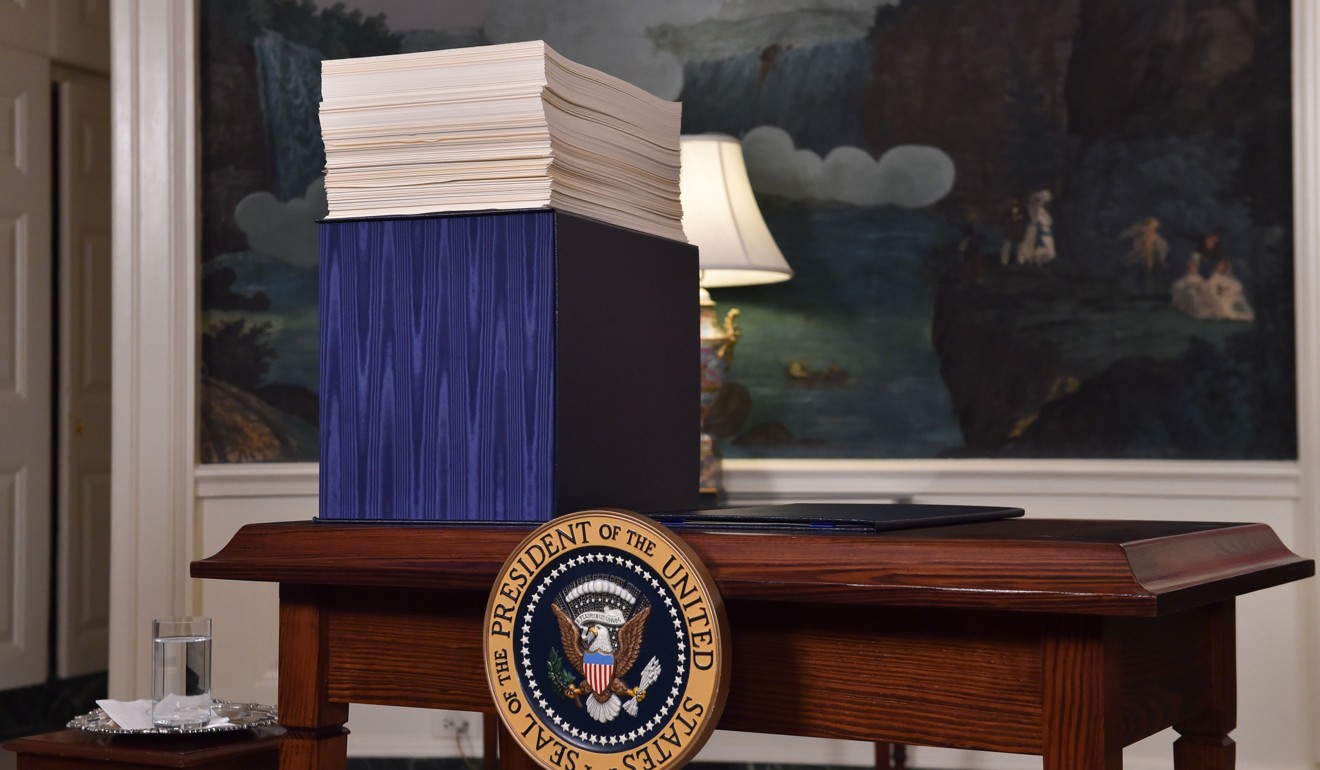
Earlier on Friday, Trump cast doubt on whether he would back the massive spending bill, saying he was “considering” a veto. Then, adding to the made-for-TV drama, he scheduled a news conference.
Telegraphing the outcome, an internal White House television feed advertised the event this way: “President Trump Participates in a Bill Signing.”
With Congress already on recess, Trump had said on Twitter that he was weighing a veto.
He said that young immigrants now protected in the US under Barack Obama’s Delayed Action for Childhood Arrivals “have been totally abandoned by the Democrats (not even mentioned in Bill) and the BORDER WALL, which is desperately needed for our National Defense, is not fully funded.”
He later explained at the signing that he had wanted to back out for those reasons, but had pressed on to secure military funding.
Trump’s tweet had been at odds with what top members of Trump’s administration and House Speaker Paul Ryan said Thursday, and with a formal statement of administration policy, which said Trump was supportive of the measure.
It came hours after the Senate early Friday morning passed the spending package aimed at keeping the government open past midnight.
Trump has been increasingly frustrated with the media coverage of the bill, as conservative lawmakers and other critics have railed against it on cable news and in private calls.
His tweet was cheered by the conservative House Freedom Caucus, which voted against the spending bill along with two dozen Republicans in the Senate.
Rep. Mark Meadows, R-N.C., chairman of the freedom caucus and a friend of the president, said in a tweet that the group would “fully support” a veto, adding that Congress should pass a short-term budget resolution while Trump and congressional leaders “negotiate a better deal for the forgotten men and women of America.”
Sen. Senator Bob Corker, R-Tenn., also egged Trump on. “Please do, Mr. President,” he tweeted. “I am just down the street and will bring you a pen. The spending levels without any offsets are grotesque, throwing all of our children under the bus. Totally irresponsible.”
“Make my day, Mr. President,” taunted Rep. Kurt Schrader, D-Ore.
The Senate passage of the bill averted a third federal shutdown this year, an outcome both parties wanted to avoid. But the budget caps-busting deal drew serious conservative opposition.
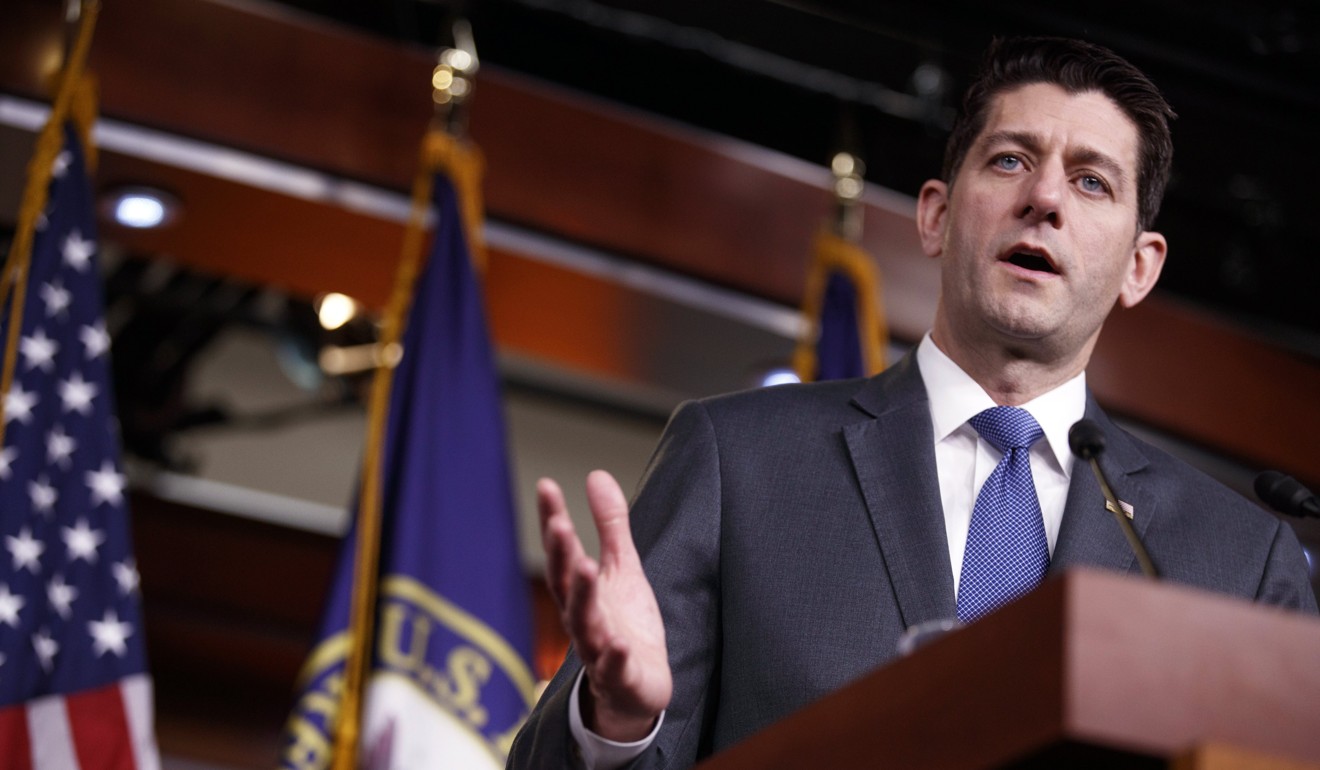
It also failed to resolve the stalemate over shielding young Dreamer immigrants from deportation after Trump’s decision to end the Deferred Action for Childhood Arrivals programme last year.
While Trump has repeatedly criticised Democrats over DACA, he cancelled the programme last fall, ending the issuance of new DACA permits. A judge has forced the administration to continue issuing renewals.
The spending package includes US$1.6 billion for Trump’s long-promised border wall with Mexico. But less than half of the nearly 95 miles (153 kilometres) of border construction that have been approved can be spent on new barriers. The rest can only be used to repair existing segments.
The money was far less than the US$25 billion over 10 years Trump had asked for as part of a last-ditch deal that would have included providing a temporary extension of the DACA programme. White House budget officials have nonetheless tried to spin the funding as a win.
“We ended up asking for 74 miles worth of wall, we get 110. Not exactly what we wanted where we wanted,” said budget director Mick Mulvaney Thursday. “But generally speaking, we think this is a really, really good immigration package,” he said.
Trump, meanwhile, has tried to pin the failure to reach a DACA deal on Democrats, arguing, “They don’t want DACA” and are merely trying to use the issue as “a political football.”
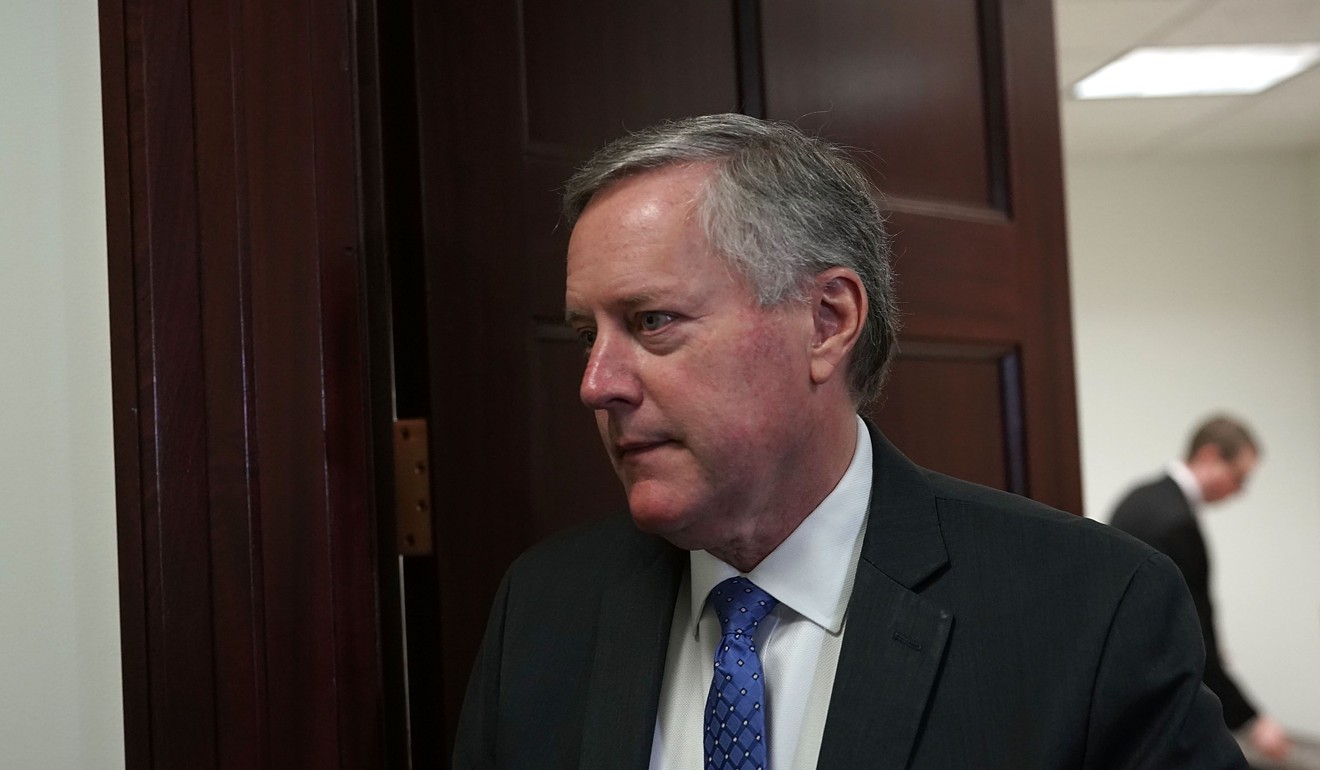
One Democratic aide said Friday they believed Trump was just trying to get a reaction from Democrats, while another predicted that Trump will ultimately sign the bill. The aides asked not to be named to speak frankly.
The House easily approved the spending package Thursday, 256-167, a bipartisan tally that underscored the popularity of the compromise, which funds the government through September. It beefs up military and domestic programmes, delivering federal funds to every corner of the country.
But action stalled in the Senate, as conservatives ran the clock in protest. Once the opponents relented, the Senate began voting, clearing the package by a 65-32 vote.
“Shame, shame. A pox on both Houses – and parties,” tweeted Sen. Rand Paul, R-Ky., who spent the afternoon tweeting details found in the 2,200-page bill that was released the night before. “No one has read it. Congress is broken.”
The omnibus spending bill was supposed to be an antidote to the stopgap measures Congress has been forced to pass – five in this financial year alone – to keep government temporarily running amid partisan fiscal disputes.
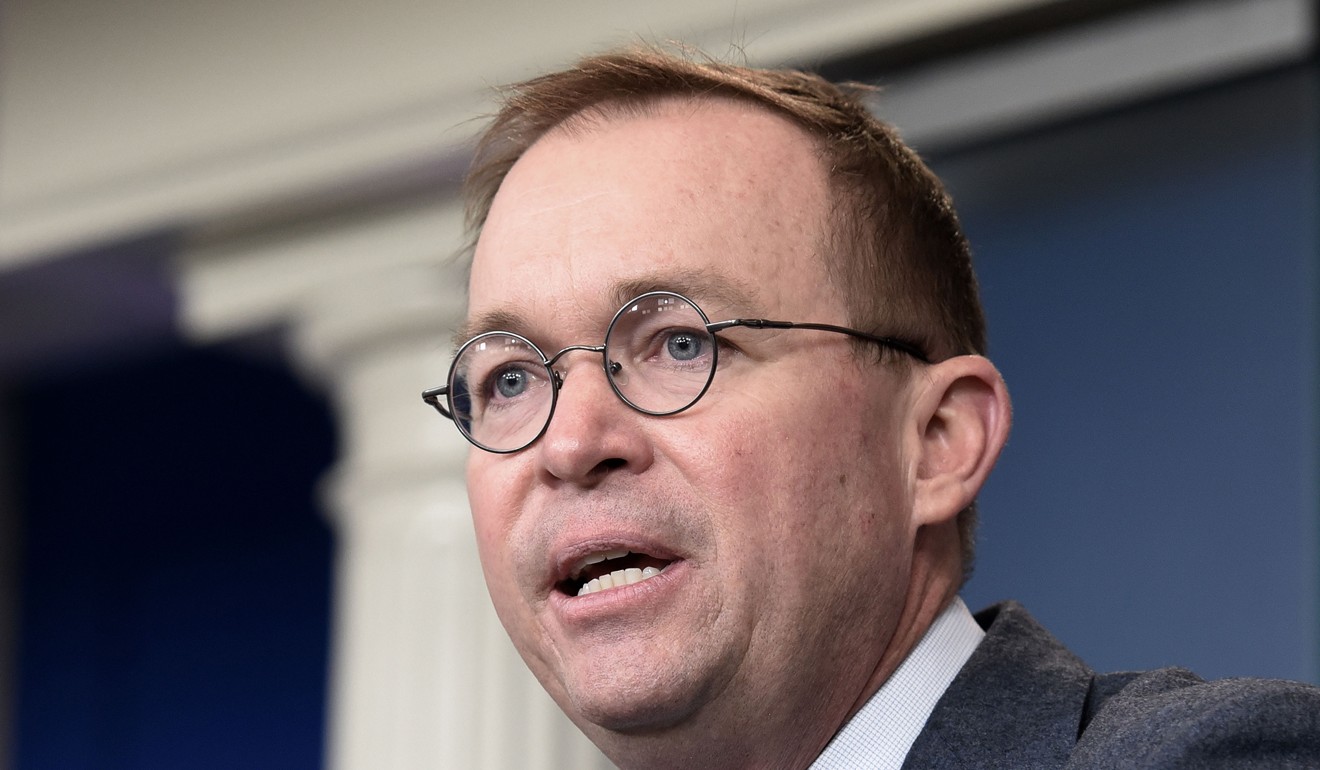
White House legislative director Marc Short framed it as a compromise. “I can’t sit here and tell you and your viewers that we love everything in the bill,” he said on Fox. “But we think that we got many of our priorities funded.”
But the overall result has been unimaginable to many Republicans after campaigning on spending restraints and balanced budgets. Along with the recent Republican Party tax cuts law, the bill that stood a foot tall at some lawmakers’ desks ushers in the return of US$1 trillion deficits.
Trying to smooth over differences, Republican leaders focused on military increases that were once core to the party’s brand as guardians of national security.
But even that remained a hard sell – a sign of the entrenched Republican Party divisions that have made the leadership’s job controlling the majority difficult. They is likely to repeat in the next budget battle in the fall.

